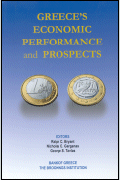MEDIA SUMMARY
Portugal’s euro crisis adjustment not the unmitigated success claimed; Results more mixed
Program may have put economy in right direction, but public finances still shaky
In spite of German Finance Minister Wolfgang Schäuble and the IMF declaring Portugal’s post-euro crisis adjustment program a “success,” Portugal’s public finances are still in shaky grounds, according to Columbia University’s Ricardo Reis in an update to his earlier paper on Portugal’s slump-crash. While deft management of the public debt makes a crisis in the near future unlikely, public debt is 130 percent of GDP, austerity was more mild than often reported, and a lack of reform of social security will push public spending higher thanks to Portugal’s generous pension system. At the same time, the Portuguese economy has changed in many directions that seem promising, including a reversal of its misallocation of resources, increases in exports, more educated workers, less protection of local interests, and increasing output in the least productive sectors. In the long run, the definite tests of economic adjustment will be whether fast economic growth in the next few years is able to offset the stagnation of the last 15, and whether an agreement with the troika allows for a fall in the market value of the public debt.
The Brookings Institution is committed to quality, independence, and impact.
We are supported by a diverse array of funders. In line with our values and policies, each Brookings publication represents the sole views of its author(s).







